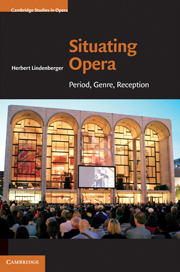Book contents
- Frontmatter
- Contents
- Acknowledgements
- Prologue
- 1 Anatomy of a warhorse: Il trovatore from A to Z
- 2 On opera and society (assuming a relationship)
- 3 Opera and the novel: antithetical or complementary?
- 4 Opera by other means
- 5 Opera and/as lyric
- 6 From separatism to union: aesthetic theorizing from Reynolds to Wagner
- 7 Toward a characterization of modernist opera
- 8 Anti-theatricality in twentieth-century opera
- 9 A brief consumers' history of opera
- Epilogue
- WORKS CITED
- Index
Prologue
Why opera? Why (How, Where) situate?
Published online by Cambridge University Press: 05 August 2011
- Frontmatter
- Contents
- Acknowledgements
- Prologue
- 1 Anatomy of a warhorse: Il trovatore from A to Z
- 2 On opera and society (assuming a relationship)
- 3 Opera and the novel: antithetical or complementary?
- 4 Opera by other means
- 5 Opera and/as lyric
- 6 From separatism to union: aesthetic theorizing from Reynolds to Wagner
- 7 Toward a characterization of modernist opera
- 8 Anti-theatricality in twentieth-century opera
- 9 A brief consumers' history of opera
- Epilogue
- WORKS CITED
- Index
Summary
Why opera? Why (How, Where) situate?
interlocutor: Still another book on opera?
author: You mean by me or in general?
interlocutor: Both.
author: I still have a thing or two to say about opera.
interlocutor: Does the world need another book on this topic?
author: It's a much bigger topic than it seemed thirty years ago when I first wrote on it. Opera's been exploding all over the place: new audiences, new companies (and in towns where you could never have imagined opera before), new approaches to how one stages the thing, and, to top it off, as I'll show in the epilogue, a whole new area of inquiry that people are calling opera studies.
interlocutor: How can you even speak of an explosion when we know that for most people these days classical music is giving way to popular forms?
author: That may be true of some classical genres, but opera is flourishing more than ever. When I was growing up in Seattle during the 1930s you got only a single week of opera a year – and this from a touring group called the San Carlo Opera, which did only the most tired of warhorses, and with the flimsiest of sets, and singers who could charitably be described as of bush-league quality. Today, though I no longer live there, the city boasts its own company with a respectably sized season plus a summer Ring that draws international audiences.
- Type
- Chapter
- Information
- Situating OperaPeriod, Genre, Reception, pp. 1 - 7Publisher: Cambridge University PressPrint publication year: 2010



